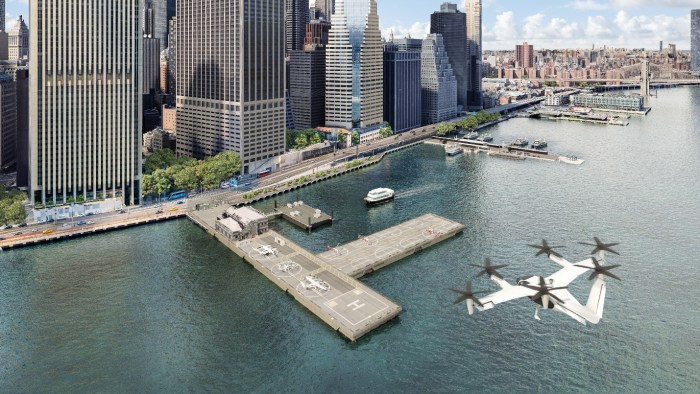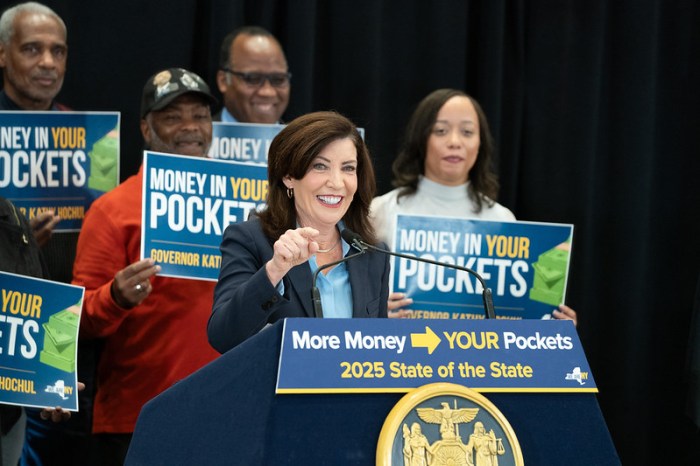
BY TERESE LOEB KREUZER | Battery Park City Authority executives Tessa Huxley and Robert Serpico don’t usually cry at board meetings, but both had tears in their eyes Jan. 29 when Huxley announced Vince McGowan’s retirement from the Battery Park City Parks Conservancy.
McGowan joined the conservancy in January 2000 as assistant executive director. Previously, he had held executive positions at the Hudson River Park Trust and its predecessor, the Hudson River Park Conservancy.
Between 1998 and 2000, he created routes and docking locations for New York Water Taxi. His earlier career included stints as a bar owner, four years of service in the Marines (two of them in Vietnam) and several years in the late 1960’s and early 1970’s with the Rand Corporation “helping to organize the people in Guatemala to overthrow the oppressive government there.”
His bond with Huxley and Serpico, chief financial officer of the Battery Park City Authority, was forged on 9/11. At the time, Serpico was president of the neighborhood conservancy. “When the buildings fell, he was literally thrown into the window of Chase Manhattan Bank,” McGowan recalled.
McGowan himself was on the corner of Vesey and West Sts. when the first building came down.
“I started to run because things were falling right around me,” he said. “I’ve been in combat too many times to not understand the consequences.”
He had a throwaway camera that he grabbed from a kiosk whose owner had already fled. “As I was running, I was taking pictures with this little camera of fire-sticks hitting in front of me,” he said. “I was waiting for one to take me out but I got to that cutout by the American Express entrance and I dove in there and that’s when the dust cloud swept by me and buried me in five feet of dust.”
He said it was as frightening as anything he had experienced in Vietnam. “Having been under severe fire, when you think this is not going to end well, it’s extremely terrifying,” he stated. “But you go through a moment just coming to grips with yourself saying, ‘OK this is where it all stops.’ Thank God it didn’t, but that’s what happens to you. But I’ve been in so many cases where I didn’t think I was going to get out of it — things happened in Central America, plane crashes and stuff like that. You have to be resilient.”
On 9/11, Huxley, the executive director of the B.P.C. Conservancy, Serpico and McGowan stayed behind after everyone else left.
“We had assisted all the residents in leaving here by boat,” McGowan recalled. “Twelve of us received commendations from the Coast Guard for our actions that day, myself included. Tessa and I were given awards by the City for our actions and the Humane Society gave me an award for saving a woman’s dogs. I went up 15 flights of stairs to get her dogs out of her apartment.”
For 11 days, McGowan, Huxley and Serpico remained in Battery Park City, patrolling the area to prevent scavenging. “The place was abandoned,” said McGowan. “Windows were broken so you needed a presence around here because the cops and the firemen were exhausted. This was before the National Guard came in.” Among other things, they put out fires started by sparks from the World Trade Center because, “All the firemen were concentrating over there. No one was paying attention here.”
After the immediate crisis passed, the trio faced the grueling, long-term work of restoring the Battery Park City gardens. The aftermath of Superstorm Sandy promises to be no different.
“Everything that was under water has to be looked at and brought back to a proper level of repair,” McGowan said. “All the electric is underground here. Everything will get done eventually. But that requires constant monitoring and constant tweaking and constant paying attention to make sure that power doesn’t fail at inopportune times.”
The prospect of going through this prompted his retirement, which was just announced but was effective at the end of December.
“I know about how much work it takes to accomplish what actually needs to get done here,” he said. “In 2001, I was prepared to put in the 15-hour days and endless weeks but now I’m 68 years old and I’m not prepared to do that any longer. It needs younger people to make sure that everything gets put back together and I’m not willing to commit that time.”
Not that McGowan plans to be idle. Far from it.
His years in Vietnam as a Marine and his subsequent experiences as a veteran continue to shape his life. He was the founding president of the United War Veterans Council, a member of the city’s Veterans Advisory Board (appointed by Mayor Michael Bloomberg in 2002), and the producer of every Veterans Day parade since 1994. He is particularly proud of resurrecting the parade.
“In 1985, New York City was in a downward spiral,” he recalled. “It was so bad that the veterans’ community decided to stop celebrating our service and discontinue the Veterans’ Day parade, which had started in 1990 here in New York.”
But, he said, he and “two other guys – a colonel in the Air Force and a lieutenant in the Navy – we weren’t going to let the parade die. At one point with [former Mayor] David Dinkins we found ourselves – 23 of us – walking down Fifth Ave. going to the eternal light in Madison Square Park and that’s all we could muster.”
Last year, the parade was nationally televised, with 60,000 people lining the parade route.
Among the projects that McGowan wants to work on now are the restoration of the city’s war memorials that were flooded by Sandy (including the Vietnam memorial at 55 Water St.) and raising money for the United Veterans War Council, which produces the Veterans Day parade and a wide range of other events and programs.
McGowan, who enlisted in the Marines following John Kennedy’s assassination in 1963 and who volunteered for hazardous duty, still has shrapnel in his legs. He was deeply hurt by the reception that he and others received when they returned home.
“I think Americans abandoned the Vietnam veterans in the field,” he said. “There are consequences to that.” He said that he knew a lot of veterans who committed suicide. He is the founding member of the Suicide Prevention Foundation.
Now, with the 50th anniversary of the Vietnam War approaching in 2014, the public attitude toward those years is different. McGowan is among those planning the anniversary observances.
He also said that he won’t abandon Battery Park City if his help is needed. “I’ll be right along side of you as long as I live on the West Side, which will be for the rest of my life,” he remarked at the B.P.C.A. board meeting where Huxley announced his retirement. “I’m a phone call away. I have a lot of institutional memory if I can be of help.”
McGowan’s life has been tumultuous, sometimes dangerous and enormously productive. “I’ve had a lot of fun,” he said, summing it up so far. “I have no regrets.”































